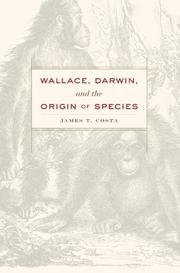

WALLACE, DARWIN, AND THE ORIGIN OF SPECIES
by James T. Costa
An in-depth look at the seminal contributions of Alfred Russel Wallace (1823-1913)—often solely attributed to Charles Darwin (1809-1882)—that led “to revolutionary new understandings of earth history and of the life upon earth in the mid- to late nineteenth century.”
This book is a follow-up by Costa (Biology/Western Carolina Univ.; The Other Insect Societies, 2006 etc.) to On the Organic Law of Change: A Fascimile Edition and Annotated Transcription of Alfred Russel Wallace's Species Notebook of 1855-1859 (2013), which he edited and annotated. The author convincingly navigates potentially treacherous terrain, setting the record straight on Wallace's great achievement, which independently foreshadowed Darwin's On the Origin of the Species without in any way diminishing Darwin's “insights and accomplishments.” Costa provides an account of Wallace's scientific career leading up to his discovery and thereafter. Wallace first established himself as a naturalist, collecting specimens in Brazil and Southeast Asia and authoring books on his travels. Younger than Darwin by more than a decade, Wallace was familiar with Darwin’s earlier writings. In 1858, unaware that Darwin was writing his magnum opus, Wallace sent him a review copy of a paper he hoped to see published. Entitled On the Tendency of Varieties to Depart Indefinitely from the Original Type, it revealed the mechanism of natural selection in evolution. Darwin had been slow to reveal his own discovery of the theory, fearing the opprobrium he knew would follow publication. Now, to his distress, he was in danger of being scooped. At the suggestion of friends, a hitherto unpublished preliminary paper by Darwin was presented to a meeting of the Linnean Society together with Wallace's paper, establishing their joint priority and launching a fruitful future scientific collaboration.
An illuminating, nuanced account of the parallel discovery of a theory still deemed controversial by some.